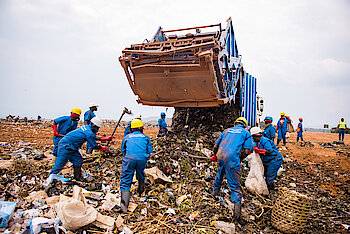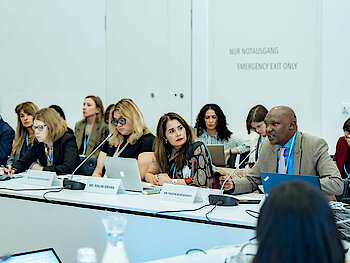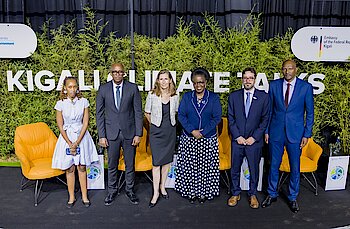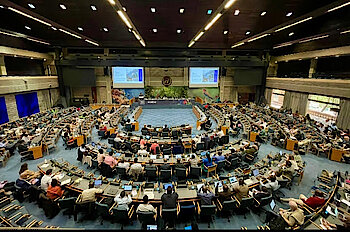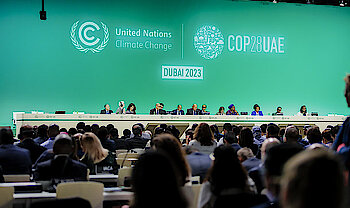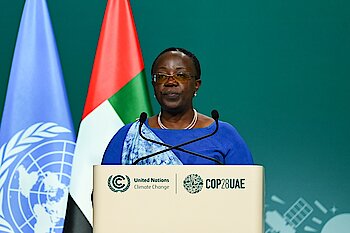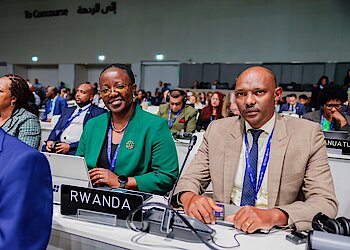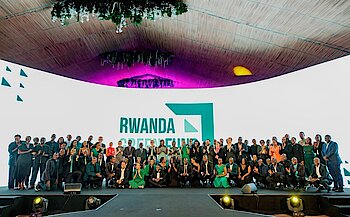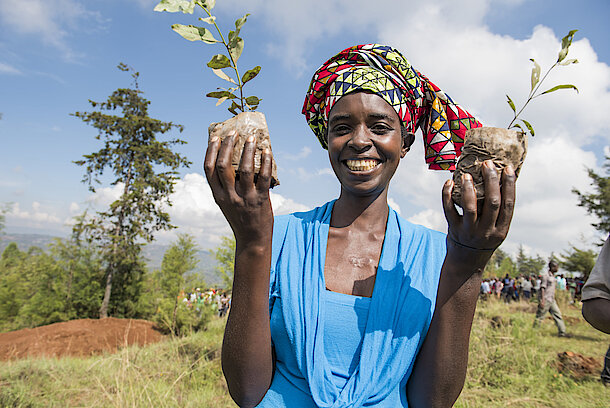
Why Women’s Consideration is a Key in battling climate change impacts?
The livelihoods of billions of people throughout the world are highly impacted by climate change, despite efforts to reduce its hazards. This is manifested by floods, droughts, windstorms, water scarcity, diminished biodiversity, and other extreme weather occurrences that are having an adverse effect on their lives. These extreme weather events have impacts on human well-being by creating food shortages, contaminating water bodies used for consumption, livelihood, or recreation, and damaging vital infrastructures.
Despite the fact that climate change affects all levels of society, the severity of these catastrophes varies. Several studies show that women and girls are particularly vulnerable to the effects of climate change, most likely because they rely heavily on land and natural resources for household food and income generation.
Climate change exacerbates gender disparities, making it more difficult for women to achieve financial independence, and leaving them not being more resilient to climate change impacts.
Women are highly affected by climate change, because of their domestic roles which often make them predominant users of natural resources such as water, firewood and forest products. They have a heavier labour load when these resources become more limited, which may cause them to experience additional hardship. For example, women predominate in the world's food production (50–80 percent), but they own less than 10 percent of the land. During extreme weather such as droughts and floods, women tend to work more to secure household livelihoods and duties. As a consequence, it influences crop yields as well as hunger, nutrition, and loss of life than men.
Even though women face those challenges, they are not effectively involved in addressing climate change. In this respect the exclusion of their voice makes their knowledge in the environment and hardship they face to be not fully resolved. Therefore, countries should invest in gender action plans for climate change that are participatory, multi-stakeholder, and multi-sectoral since these can help build integrated solutions to cope with social inequality in the face of climate change. This is supported by the Intergovernmental Panel on Climate Change (IPCC, 2022) report that upholds the fact that climate change effects are not gender neutral. It further notes that women and children are among the highest-risk groups.
How can women be fully engaged in addressing climate change?
It is worthy noting that for addressing climate change effectively, it is important to recognize that women are affected by climate change differently. Women continue to bear a disproportionate burden from the adverse impacts of climate change, like during disasters women face heightened real-life challenges such as being vulnerable to different forms of sexual and gender-based violence as they are the ones who travel miles and miles during dry seasons to collect household water and firewood.
Despite some progress having been made over recent years, the gender perspective needs further work to be fully integrated into the processes of formulating and implementing policies and actions on the ground.
There must be policies and plan in place across all sectors that take into account women's perspectives in numerous subject areas, such as health risks; promotion of education for women and girls in science, engineering, technology, and other fields related to the climate change, as well as enhanced access by women to and control over land, water, energy, and other natural resources.
What could be the importance of considering women
As the aim of the paris agreements is to strengthen the global response to the threat of climate change by keeping a global temperature rise this century well below 2 degrees celsius above pre-industrial levels and to pursue efforts to limit the temperature increase even further to 1.5 degrees celsius as well as to increase the capacity of countries to deal with the impacts of climate change.
As 70% of the world's 1.3 billion poor people are women, and 40% of the poorest households are headed by women. Regardless that they are most vulnerable to climate change, during severe extreme weather events, women handle the majority of household duties. In developing countries women occupy 70% of farming activity which feeds more than 50% of developing countries population.
Women have to be considered in all climate change measures especially in mitigation and adaptation to reduce their vulnerability and build resilience in key sectors, such as water, agriculture and human settlements. If women are empowered in these sectors the community and society will benefit. In addition, women's challenges have to be integrated in project development to ensure their problems are addressed during project implementation.
Progress in engaging women in addressing climate change in Rwanda
People have different adaptation needs depending on where they live, how they sustain their livelihood, and the role they play in their family and community. In this regard, Rwanda mainstream and integrates gender in the environment and climate change sector. For instance, there are different policies and strategies that were established to ensure that women and girls are considered in all sectors. As of now, Rwanda is the first country in the world with a female majority in parliament with 61.3% in the Chamber of Deputies and 36% in the Senate.
Rwanda National Environment and Climate Change Policy has put in place mechanisms to develop and promote green technologies in all sectors of economic development and facilitate appropriate climate change mitigation and adaptation technological development, including strategies to increase human capacity, especially amongst the youth and women. This policy also urges and encourages effective involvement of women and youth in environmental and climate change management, intervention, and decision-making as essential.
Topics
More posts
Rwanda to embark the development of Short-Lived Climate Pollutants Plan
Image: Nduba Landfill in Kigali City, (The landfll is known as one source of methane gas which is the greenhouse gas and the short lived pollutants);…
RWANDA’S NEGOTIATORS ARE IN BONN PUSHING FOR CLIMATE FINANCE
Rwanda’s negotiators led by Mr. Faustin Munyazikwiye – Deputy Director General of the Rwanda Environment Management Authority (REMA) – are in Bonn,…
Rwanda and Germany launch the “Kigali Climate Talks”
On 9 May 2024, Dr Jeanne d’Arc Mujawamariya, Rwanda’s Minister of Environment, and Heike Uta Dettmann, Ambassador of the Federal Republic of Germany,…
Tackling Short-Lived Climate Pollutants: Insights from CCAC2024 Conference
The Climate and Clean Air Conference 2024 (CCAC2024), took place in Nairobi, Kenya, on the sidelines of the Sixth session of the United Nations…
RWANDA WELCOMES HISTORIC COP28 DECISION TO TRANSITION AWAY FROM FOSSIL FUELS
The Government of Rwanda has welcomed the ground-breaking decision made at the 28th Conference of the Parties (COP28) to the United Nations Framework…
NATIONAL STATEMENT - COP28 UN CLIMATE CHANGE CONFERENCE
Delivered by Dr Jeanne d’Arc Mujawamariya, Minister of Environment
To begin, I express my gratitude to His Highness Sheikh Mohamed bin Zayed…
Follow the UNEP Pavilion Discussion on the Role of Industry & Finance in Supporting the Adaptation Agenda at COP28
This session, which comes at the conclusion of Industry Day is designed to offer comprehensive insights into the roles of industry and finance in…
Rwanda to call for more ambitious climate action at COP28
At this year’s UN Climate Change Conference, known as COP28, Rwanda will call for more ambitious climate action, a doubling of funding for adaptation…
Rwanda Green Fund Celebrates a Decade of Impact
The Rwanda Green Fund has marked its 10th anniversary, a remarkable milestone of transformative impact in Rwanda. Established in 2012, the Fund has…
